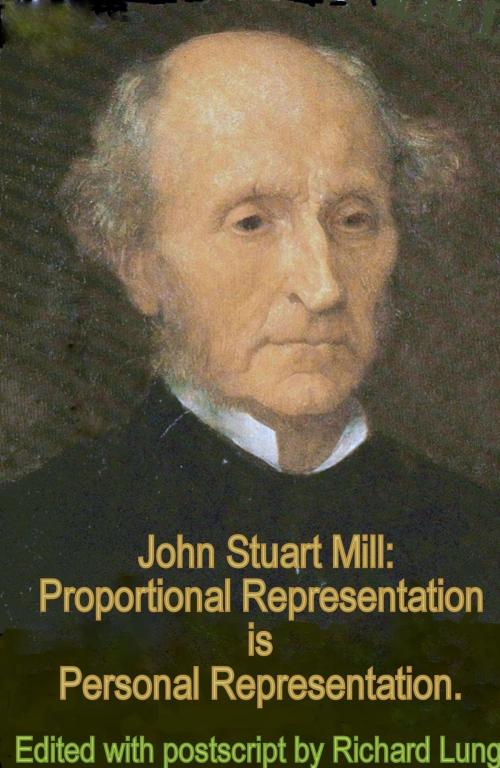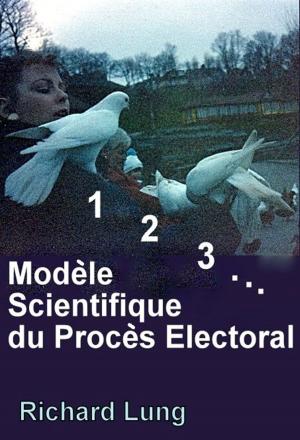John Stuart Mill: Proportional Representation is Personal Representation.
Nonfiction, Religion & Spirituality, Philosophy, Methodology, Social & Cultural Studies, Political Science, Government, Democracy| Author: | Richard Lung | ISBN: | 9780463533406 |
| Publisher: | Richard Lung | Publication: | June 22, 2018 |
| Imprint: | Smashwords Edition | Language: | English |
| Author: | Richard Lung |
| ISBN: | 9780463533406 |
| Publisher: | Richard Lung |
| Publication: | June 22, 2018 |
| Imprint: | Smashwords Edition |
| Language: | English |
The unstable one-sided development of mankind is shown by comparing Mill the natural philosopher to Mill the political philosopher. For, A System Of Logic is like a work of antiquity, but Representative Government, after a century and a half, is still in advance of current thought.
As John Stuart Mill MP said, Proportional Representation is Personal Representation. He had the prescience to defy the ascendancy of party, that defines the Age of Benightenment.
"Why is it, then, that such a system of representation [voting for party "flags"] would be intolerable to us?
Sir, it is because we look beyond parties; because we care for something besides parties; because we know that the constitution does not exist for the benefit of parties, but of citizens; and we do not choose that all the opinions, feelings, and interests of all the members of the community should be merged in the single consideration of which party shall predominate. We require a House of Commons which shall be a fitting representative of all the feelings of the people, and not merely of their party feelings. We want all the sincere opinions and public purposes which are shared by a reasonable number of electors to be fairly represented here; and not only their opinions, but that they should be able to give effect by their vote to their confidence in particular men."
John Stuart Mill MP, 30 May 1867.
In the 18th century, the French philosophes founded the study of voting method. The 19th century saw steady progress. The main discovery, by Carl Andrae, and independently by Thomas Hare was proportional representation. The Hare plan was taken into Parliament by Mill, and has been a feature of English-speaking countries ever since, despite professional politics severely restricting its use. Consequently, the 20th century saw minimal academic advance in scientific standards of electoral practice (besides Meek method).
The wisdom of John Stuart Mill helps to find our way again.
This Mill anthology includes remiscence of the man (by George Jacob Holyoake and Elbert Hubbard) and study of Mill the thinker (by Hippolyte Taine, commended by Mill) as well as selections from Mill the author, parliamentary orator, and letter writer.
A postscript, by the editor, stresses the import of his political thought and personal character to our times.
The unstable one-sided development of mankind is shown by comparing Mill the natural philosopher to Mill the political philosopher. For, A System Of Logic is like a work of antiquity, but Representative Government, after a century and a half, is still in advance of current thought.
As John Stuart Mill MP said, Proportional Representation is Personal Representation. He had the prescience to defy the ascendancy of party, that defines the Age of Benightenment.
"Why is it, then, that such a system of representation [voting for party "flags"] would be intolerable to us?
Sir, it is because we look beyond parties; because we care for something besides parties; because we know that the constitution does not exist for the benefit of parties, but of citizens; and we do not choose that all the opinions, feelings, and interests of all the members of the community should be merged in the single consideration of which party shall predominate. We require a House of Commons which shall be a fitting representative of all the feelings of the people, and not merely of their party feelings. We want all the sincere opinions and public purposes which are shared by a reasonable number of electors to be fairly represented here; and not only their opinions, but that they should be able to give effect by their vote to their confidence in particular men."
John Stuart Mill MP, 30 May 1867.
In the 18th century, the French philosophes founded the study of voting method. The 19th century saw steady progress. The main discovery, by Carl Andrae, and independently by Thomas Hare was proportional representation. The Hare plan was taken into Parliament by Mill, and has been a feature of English-speaking countries ever since, despite professional politics severely restricting its use. Consequently, the 20th century saw minimal academic advance in scientific standards of electoral practice (besides Meek method).
The wisdom of John Stuart Mill helps to find our way again.
This Mill anthology includes remiscence of the man (by George Jacob Holyoake and Elbert Hubbard) and study of Mill the thinker (by Hippolyte Taine, commended by Mill) as well as selections from Mill the author, parliamentary orator, and letter writer.
A postscript, by the editor, stresses the import of his political thought and personal character to our times.















